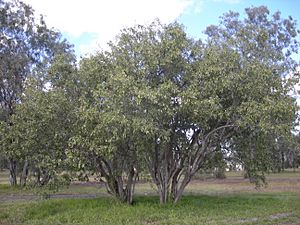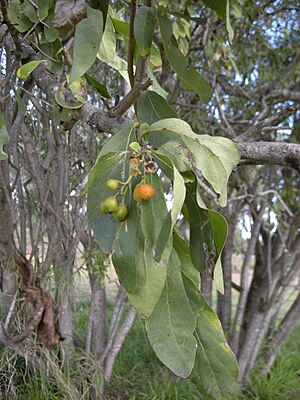Grey-leaved saucer berry facts for kids
Quick facts for kids Grey-leaved saucer berry |
|
|---|---|
 |
|
| Scientific classification | |
| Genus: |
Cordia
|
| Species: |
sinensis
|
| Synonyms | |
|
List
|
|
The Grey-leaved Saucer Berry (Cordia sinensis) is a type of flowering tree. It belongs to the borage family, called Boraginaceae. This tree grows naturally in many parts of the world. You can find it from South Africa all the way to East Africa, Madagascar, West Africa, and the Middle East. It also grows in the Indian subcontinent and Eastern Indochina. There's even a separate group of these trees in Senegal.
The tree has also started growing naturally in Eastern Australia. People call it by many names. Some common names are grey-leaved saucer berry, grey-leaved cordia, marer, mnya mate, mkamasi, and tadana.
Contents
What is Cordia sinensis?
Cordia sinensis is a plant that can grow in different ways. It can be a small bush or a tree up to 12 meters (about 39 feet) tall. The bark on its stem is usually brown or creamy brown.
Flowers and Fruits
The flowers of the Grey-leaved Saucer Berry are white or cream-colored. The fruit is shaped like a cone and turns orange or red when ripe. Inside, the fruit has a sticky, juicy pulp. This pulp covers one to four large seeds.
Where Cordia sinensis Grows
Cordia sinensis is native to many countries. These include Egypt, Ethiopia, India, Israel, Jordan, Kenya, Madagascar, Mozambique, Namibia, Niger, Pakistan, Senegal, Somalia, South Africa, Sri Lanka, Sudan, Tanzania, Yemen, and Zimbabwe.
Preferred Habitat
This tree likes dry and semi-dry places. It often grows near rivers or other water sources. These areas are called riparian zones.
How Cordia sinensis Helps Nature
The fruits of the Grey-leaved Saucer Berry are an important food source. Many animals, like monkeys and birds, love to eat them. The leaves of the tree are also food for animals. Animals such as antelope, giraffe, and deer eat the leaves.
How People Use Cordia sinensis
People use different parts of the Cordia sinensis tree for many things.
Food Uses
The fruits are safe to eat and are used in various types of cooking. The sticky substance, or gum, that comes from the tree can also be eaten.
In the Turkana region, people often eat the fruit fresh. They also collect large amounts, dry them, and store them. Later, they add water to the dried fruit to eat it. The fruit is also used to make juice or even beer. Sometimes, it is mixed with tamarind before being fermented to make beer.
In parts of Niger, the juicy pulp of the fruits is cooked. It turns into a thick syrup called "kango." This syrup is used to sweeten porridges and can be stored for a long time.
Other Uses
The wood from the tree is used as firewood. People also use it to make furniture and tools. The leaves are a very important source of fodder (food) for farm animals.
Both the roots and the bark of the tree are used in traditional medicine. They help treat different health problems in both people and animals.
See also
 In Spanish: Cordia sinensis para niños
In Spanish: Cordia sinensis para niños


